
Jefferson Airplane was an American rock band formed in San Francisco, California in 1965 that became one of the pioneering bands of psychedelic rock. The group defined the San Francisco Sound and was the first from the Bay Area to achieve international commercial success. They headlined the Monterey Pop Festival (1967), Woodstock (1969), Altamont Free Concert (1969), and the first Isle of Wight Festival (1968) in England. Their 1967 breakout album Surrealistic Pillow was one of the most significant recordings of the Summer of Love. Two songs from that album, "Somebody to Love" and "White Rabbit", are among Rolling Stone's "500 Greatest Songs of All Time".

Jefferson Starship is an American rock band from San Francisco, California, formed in 1974 by a group of musicians including former members of Jefferson Airplane. Between 1974 and 1984, they released eight gold or platinum-selling studio albums, and one gold-selling compilation. The album Red Octopus went double-platinum, reaching No. 1 on the Billboard 200 chart in 1975. The band went through several major changes in personnel and genres through the years while retaining the Jefferson Starship name. The band name was retired in 1984, but it was picked up again in 1992 by a revival of the group led by Paul Kantner, which has continued since his death in 2016.

Grace Slick is a retired American musician and a painter whose musical career spanned four decades. She was a prominent figure in San Francisco's psychedelic music scene during the mid-1960s to the early 1970s.

John Barbata was an American drummer who was active especially in pop and rock bands in the 1960s and 1970s, both as a band member and as a session drummer. Barbata served as the drummer for The Turtles, Crosby, Stills, Nash & Young, Jefferson Airplane, and Jefferson Starship. Barbata claimed to have played on over 60 albums in an uncredited capacity.

John Michael Thomas is an American rock singer. He is best known as one of the lead vocalists of Jefferson Starship and Starship. Prior to joining Jefferson Starship, he was a member of Elvin Bishop's band as a backing and occasional lead vocalist. He was the lead singer on Bishop's most well-known song, "Fooled Around And Fell In Love."
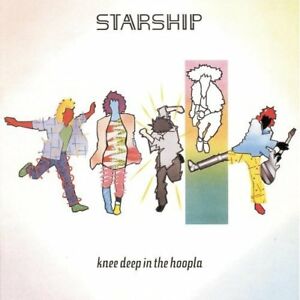
Knee Deep in the Hoopla is the debut studio album by American AOR band Starship, the succeeding musical project to Jefferson Starship. It was released on September 12, 1985, through record label Grunt. Four singles were released from the album: the No. 1 hits "We Built This City" and "Sara", "Tomorrow Doesn't Matter Tonight" and "Before I Go".

Martyn Jerel Buchwald, known as Marty Balin, was an American singer, songwriter, and musician best known as a member of Jefferson Airplane and Jefferson Starship.
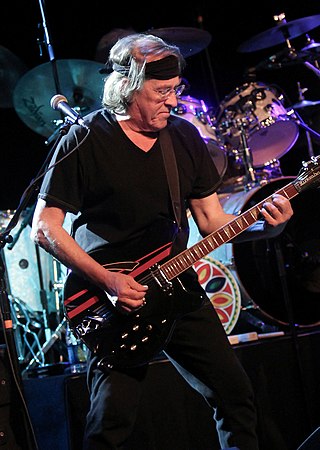
Paul Lorin Kantner was an American rock musician. He is best known as the co-founder, rhythm guitarist, and a secondary vocalist of Jefferson Airplane, a leading psychedelic rock band of the counterculture era. He continued these roles as a member of Jefferson Starship, Jefferson Airplane's successor band.

Starship is an American rock band from San Francisco, California. Initially a continuation of Jefferson Starship, it underwent a change in musical direction, the subsequent loss of personnel, and a lawsuit settlement that led to a name change. Starship's 1985 album, Knee Deep in the Hoopla, was certified platinum by the RIAA, and included two singles that went to number one on the US Billboard Hot 100 chart: "We Built This City" and "Sara". Their follow up album, No Protection, released in 1987, was certified gold and featured the band's third number one single, "Nothing's Gonna Stop Us Now". After a short hiatus in the early 1990s, the band reformed in 1992 as "Starship featuring Mickey Thomas" and resumed touring.

Craig Clinton Chaquico is an American guitarist, songwriter, and composer. From 1974 to 1990 he was lead guitarist for the rock bands Jefferson Starship and Starship. In 1993, he started a solo career as an acoustic jazz guitarist and composer.
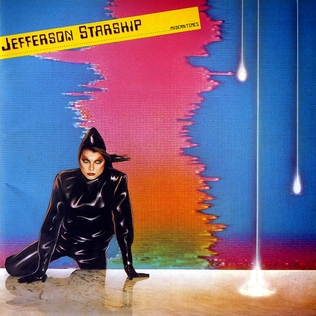
Modern Times is the sixth album by Jefferson Starship and was released in 1981. Grace Slick appeared on this album after a three-year absence. She returned near the end of the recording sessions, providing background vocals on some tracks as well as lead vocals on the single "Stranger" as a duet with lead singer Mickey Thomas. "Stranger" had previously been performed live by Jefferson Starship as early as December 1979, and the first studio version was made for Modern Times. Although not appearing in the band picture on the gatefold cover, Slick is listed on the back cover of the LP with the credit "Introducing Grace Slick" and her picture is on the lyric sleeve with the note "Grace Slick courtesy of Grace Slick." She joined the band officially for the 1981 tour. This was the first Jefferson Starship album to have promotional music videos. It was also the first album to feature a charting single on the Mainstream Rock Tracks chart, which had premiered earlier in the year. The single "Find Your Way Back" reached No. 3 on the Mainstream Rock chart.
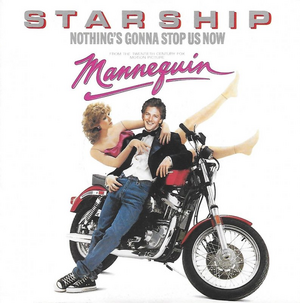
"Nothing's Gonna Stop Us Now" is a song co-written by Diane Warren and Albert Hammond and recorded by American rock band Starship for their second studio album, No Protection (1987). It is a power ballad duet featuring vocalists Grace Slick and Mickey Thomas and is the theme to the romantic-comedy film Mannequin.
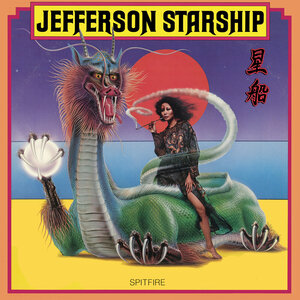
Spitfire is the third album by American rock band Jefferson Starship. Released in 1976, a year after the chart-topping Red Octopus, it quickly scaled the charts, peaking for six consecutive weeks at No. 3 in Billboard and attaining a RIAA platinum certification. The album features writing contributions from members of singer Marty Balin's former band Bodacious DF, as well as Jesse Barish, who became one of Balin's frequent collaborators. Stereo and quadraphonic mixes of the album were released. "Song to the Sun" was included in the 1977 Laserock program.
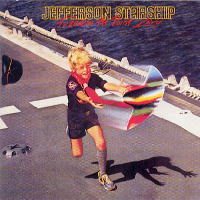
Freedom at Point Zero is the fifth album by American rock band Jefferson Starship, released in 1979. It was the first album for new lead singer Mickey Thomas, and the first after both Grace Slick and Marty Balin left the previous year. Aynsley Dunbar plays drums on this album; he had left Journey the previous year. The album cover was shot on location in the San Francisco Bay on board the USCGC Midgett.

"Miracles" is a song written by Marty Balin and originally recorded by Jefferson Starship, appearing on its 1975 album Red Octopus.

"Starships" is a song by Trinidadian rapper and singer Nicki Minaj. It was released on February 14, 2012, by Young Money, Cash Money, and Universal Republic as the lead single from her second studio album, Pink Friday: Roman Reloaded (2012). The song was written by Nicki Minaj, Nadir Khayat, Carl Falk, Rami Yacoub, Bilal Hajji, and Wayne Hector, and it was produced by RedOne, Yacoub, and Falk.

"With Your Love" is a song written by Marty Balin, Joey Covington and Vic Smith. The song was first recorded by Jefferson Starship and was the lead single of their 1976 album Spitfire. In the US, the single peaked at number 12 on the Billboard Hot 100 and number 6 on the Adult Contemporary chart. It was also a top-ten hit in Canada.
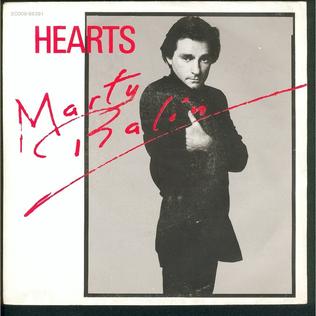
"Hearts" is a song written by Jesse Barish and performed by Marty Balin in 1981, included on his debut solo album Balin. It was Balin's third single in nineteen years and the biggest hit of his solo career.
The following is a comprehensive discography of Starship, an American rock band which spun off from Jefferson Starship in 1985.

"Count on Me" is a 1978 song and single by Jefferson Starship written by Jesse Barish for the album Earth. The single, in lighter rock mode, gave Starship another US Top 10 hit after "Miracles". It was featured in the end credits to the movies Grown Ups and The Family Stone.



















